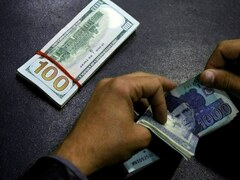EDITORIAL: Prime Minister Shehbaz Sharif while performing the ground-breaking ceremony of the first Daanish School Science and Technology Centre of Excellence in Bhimber, Azad Jammu and Kashmir, stated that “we have saved the country from falling into default by resolving key economic challenges.”
On the same day in Davos, Switzerland, while attending the World Economic Forum the Federal Minister for Finance Muhammad Aurangzeb acknowledged that the biggest issue for Pakistan has been the twin deficits - current and fiscal accounts - adding that efforts are underway to deal with them.
There is empirical evidence uploaded on the State Bank of Pakistan website that indicates that the current account deficit was positive in the second quarter of the current fiscal year largely due to a rise in remittances - 9049 million dollars in the second quarter of the current year against 7104 million dollars in the second quarter of last fiscal year, a rise of 27 percent.
The overall balance, which includes the financial balance, also improved but remains a source of concern as it registered positive 321 in the second quarter of the current year (or there was a net inflow from borrowings) against negative 865 million dollars in the first quarter of the current year (net outflow) – data that compares very favourably with the first quarter of last year at negative 3801 million dollars and negative 1129 million dollars in the second quarter.
Sadly, this does not imply that reliance on external borrowings has declined as the Finance Minister did point out that debt as a percentage of GDP has decreased from 78 percent to 67 percent.
Total borrowings were 133.5 billion US dollars by September 2024 - and have been rising since and remain a source of concern because repayment requires incurring more loans to pay the interest as well as principal as and when due which in turn leaves the country hostage to conditions imposed by donor agencies that are not only severely contractionary, with implications on growth, but are also raising poverty levels to a high of 41 percent today at par with Sub-Sahara Africa.
The budget deficit has been unsustainable since 2018 at over 7 percent each year. Needless to say, unchecked current expenditure has been the root cause of inflation in the country.
In recent months, inflation has declined though this has not impacted on the domestic rupee erosion, as (i) utility prices are constantly upgraded to meet the full-cost recovery condition set by the International Monetary Fund leading to a constant decline in the quality of life; (ii) private sector wages have not kept pace with the rate of inflation for the past five years mainly because of the poor GDP growth partly due to a negative large-scale manufacturing sector growth; and (iii) reliance on indirect taxes whose incidence on the poor is greater than on the rich remains at 75 to 80 percent of total collections.
Since late 2023 IMF has consistently refused to reach a staff-level agreement that is critical for approval of a tranche disbursement under an ongoing programme until and unless its key conditions were met which led to the friendly countries – China, Saudi Arabia and the United Arab Emirates – to unanimously decide not to roll over about 11 to 12 billion dollars a year necessary to prop up our foreign exchange reserves to provide support to the rupee.
The incumbent government therefore has no option but to follow the Fund dictates, given our indebtedness and therefore one can appreciate the pledge by the Finance Minister to implement the reforms.
However, while efforts in this regard are apparent through the formation of committees yet the country has witnessed such measures in the past with no concrete measures implemented. It has been almost nine months since the incumbent government took over the reins of decision-making and so far like in the past there have only been threats of rightsizing and punitive action by the Federal Board of Revenue. It is high time that some concrete measures are implemented.
Pakistan’s rating by the three international rating agencies remains in the junk category and in spite of the fact that Pakistan has never reneged on any payment to the Fund or any other country/agency the IMF in its 10 October 2024 noted that Pakistan’s capacity to repay is subject to “significant risks,” – elements that indicate much remains to be done.
Copyright Business Recorder, 2025





















Comments
Comments are closed.